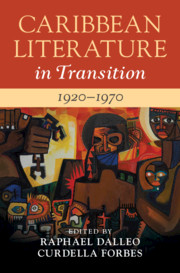Book contents
- Caribbean Literature in Transition, 1920–1970
- Caribbean Literature in Transition
- Caribbean Literature in Transition, 1920–1970
- Copyright page
- Contents
- Figure
- Contributors
- Introduction
- Part I Literary and Generic Transitions
- Part II Cultural and Political Transitions
- Part III The Caribbean Region in Transition
- Part IV Critical Transitions
- Chapter 18 Forging the Critical Canon
- Chapter 19 Forgotten Trailblazers
- Chapter 20 Recuperating Women Writers
- Chapter 21 Rhizomatic Genealogies
- Chapter 22 Writing Indo-Caribbean Masculinity
- Chapter 23 Writing and Reading Sex and Sexuality
- Bibliography
- Index
Chapter 23 - Writing and Reading Sex and Sexuality
from Part IV - Critical Transitions
Published online by Cambridge University Press: 16 December 2020
- Caribbean Literature in Transition, 1920–1970
- Caribbean Literature in Transition
- Caribbean Literature in Transition, 1920–1970
- Copyright page
- Contents
- Figure
- Contributors
- Introduction
- Part I Literary and Generic Transitions
- Part II Cultural and Political Transitions
- Part III The Caribbean Region in Transition
- Part IV Critical Transitions
- Chapter 18 Forging the Critical Canon
- Chapter 19 Forgotten Trailblazers
- Chapter 20 Recuperating Women Writers
- Chapter 21 Rhizomatic Genealogies
- Chapter 22 Writing Indo-Caribbean Masculinity
- Chapter 23 Writing and Reading Sex and Sexuality
- Bibliography
- Index
Summary
Scholars such as Ian Smith, Jennifer Rahim, Nadia Ellis, Kezia Page, Rosamond King, and Timothy Chin have debunked the idea that sex and sexuality were either peripheral to or absent from the concerns of writers of the 1920s to 1970s. An examination of the sociocultural and literary-discursive mores that may have shaped the codes by which writers and critics addressed sexual issues enables an important re-evaluation of the relationship between literary works and the politics of respectability and heteronormativity often associated with the anglophone Caribbean. This examination attends to treatments of sex and sexuality that engage with nationalism, social status, queer desire, and cultural identity, and considers whether, how, and why the literary representations shifted at different points during this period and among different language traditions.
Keywords
- Type
- Chapter
- Information
- Caribbean Literature in Transition, 1920–1970 , pp. 369 - 381Publisher: Cambridge University PressPrint publication year: 2021

